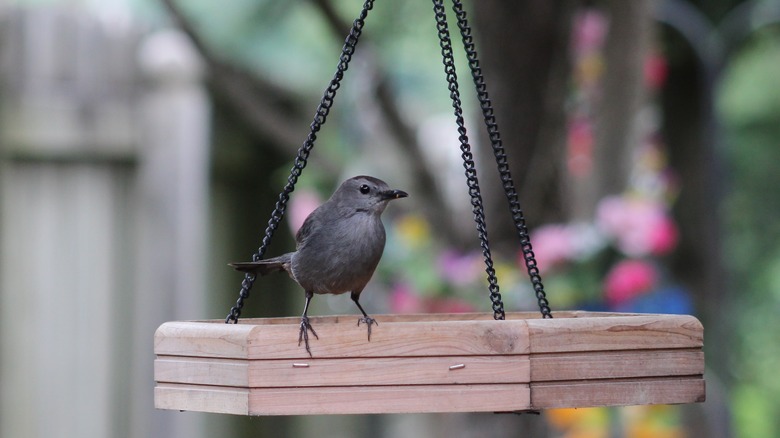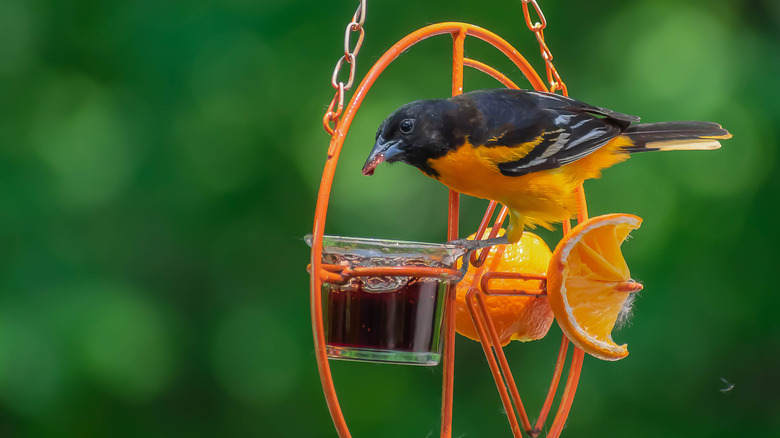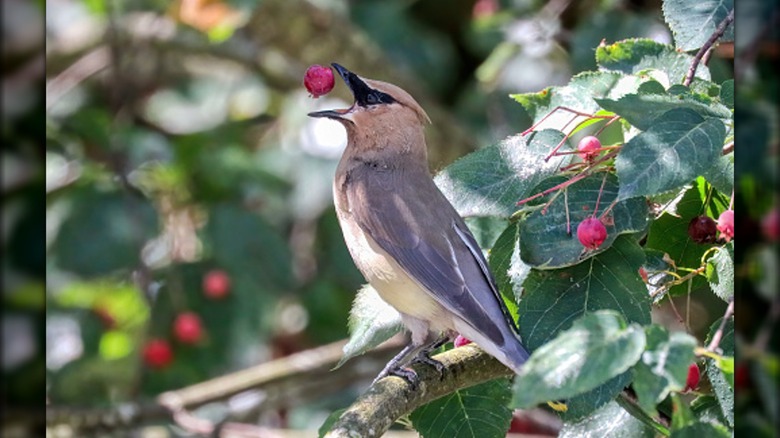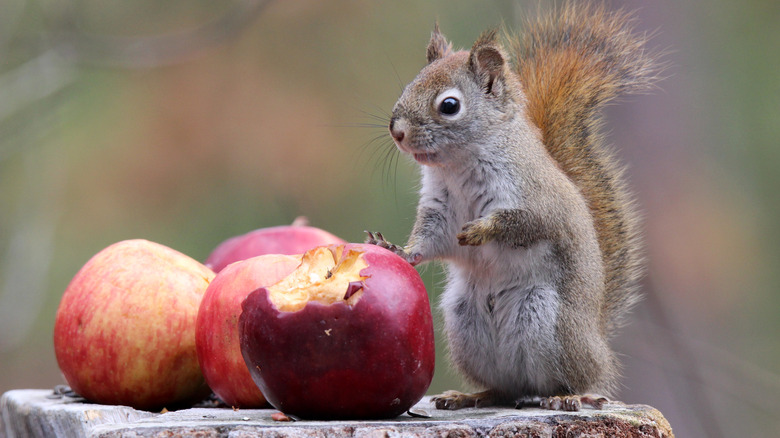Crucial Things To Consider Before Feeding Birds Fresh Fruits And Jelly
We may receive a commission on purchases made from links.
For backyard birders, migratory season can be a very exciting time. As birds move from their winter vacation destinations back to their spring breeding grounds, they must stop for fuel. By adding some special food sources during this time when birds are using an exceptional amount of energy, your birdfeeder can be the equivalent of Buc-ee's for your feathered friends. While you may stop for beef jerky and a soda, you can help birds during migration season by offering a burst of energy from healthy sources of sugar, like fresh fruit and jelly. If you decide to expand your avian meal offerings, you will need to take precautions to ensure you are not doing more harm than good.
Although it's safe to feed birds fresh fruit year-round, jelly should only be offered during the winter and migration season. These are the times when birds are using the most energy, either to stay warm or to travel. In the summer, there are plenty of natural food sources to keep them sufficiently nourished. Just like people, birds can become addicted to high levels of sugar.
Safe jelly options for birds
When selecting jelly or fruit preserves, the most important thing to do is read the ingredients. Birds should never be given artificial sweeteners, like aspartame, as well as artificial colors and flavors. Your bird friends would certainly appreciate homemade jelly from your local farmer's market –- just make sure the ingredients are clearly listed and steer clear from anything "low-sugar" or "sugar-free."
Grape jelly is a favorite of many beautiful birds, including orioles, catbirds, and even robins, since the purple color is similar to their favorite wild fruits. You are not limited to grape, though. Any fresh fruit jelly will provide a host of birds with the sugar they need for energy. Since jelly can get nasty quickly, only place a few tablespoons of jelly out at a time in a shallow bowl about 1 inch deep. If you are not sure if your feeder is safe, you can purchase an oriole feeder that has washable cups that are the perfect size for feeding your backyard birds, as well as a place to hang fresh fruit to encourage birds to flock to your yard.
Fruit for birds
We certainly are not opposed to buying fresh fruit specifically for our beautiful birds, but this is also a wonderful way to reduce excess food waste. By placing fruit you know will otherwise spoil outside, you can attract a wider array of feathered fowl to your space. Oranges are a favorite of orioles, but many other stunning birds enjoy blueberries, raspberries, cherries, apples, and more. Basically, any fruit you might have in your kitchen is a fruit that will attract grosbeaks, waxwings, woodpeckers, and so many more frugivorous birds. These are species whose diets are primarily made of up fruit sources in the wild, like those that grow on gorgeous flowering trees.
While many birds will stop for a few days and enjoy the fruitful bounty you provide, some will hang around for the breeding season in your space since they know there is a steady supply of food for their young. If you do opt to offer fresh fruit to your backyard birds, be sure to check it every day or so to make sure it hasn't gone bad, and replenish the supply as needed.
Precautions to consider
Now, we wouldn't be responsible birders if we didn't warn about some of the downsides of feeding jelly and fruit to backyard birds. As long as you keep the area and food sources free of mold and clean it regularly, everything should be safe, but that means checking every day or so. Inspect fruits and jelly to make sure they have not gone rancid. A quick sniff should tell you if it's for them to be disposed of. Also, keep in mind that feathered creatures are not the only wildlife that may be drawn to these tasty treats. Squirrels, mice, and even raccoons could take over your bird feeders. If this happens, it's best to put everything away for a bit (birdfeeders, too) to encourage the furry freeloaders to find food sources elsewhere. Insects could also be a problem, so if you notice them, you can leave dry birdseed out but refrain from feeding fresh fruit and jelly.
Perky Pet notes that even though jelly is a favorite food for many birds, it can cause problems if it gets on their plumage. That sticky sugar can prevent them from flying to escape predators or seek safety, so use a small container and only put out a little at a time.



